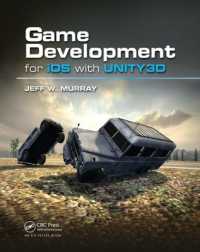- ホーム
- > 洋書
- > 英文書
- > Psychology
基本説明
New in paperback. Hardcover was published in 1998. Learning is becoming an urgent topic. Nations worry about the learning of their citizens, companies about the learning of their workers, schools about the learning of their students.
Full Description
This book presents a theory of learning that starts with the assumption that engagement in social practice is the fundamental process by which we get to know what we know and by which we become who we are. The primary unit of analysis of this process is neither the individual nor social institutions, but the informal 'communities of practice' that people form as they pursue shared enterprises over time. To give a social account of learning, the theory explores in a systematic way the intersection of issues of community, social practice, meaning, and identity. The result is a broad framework for thinking about learning as a process of social participation. This ambitious but thoroughly accessible framework has relevance for the practitioner as well as the theoretician, presented with all the breadth, depth, and rigor necessary to address such a complex and yet profoundly human topic.
Contents
Prologue; Part I. Practice: Introduction I; 1. Meaning; 2. Community; 3. Learning; 4. Boundary; 5. Locality; Coda I. Knowing in practice; Part II. Identity: Introduction II; 6. Identity in practice; 7. Participation and non-participation; 8. Modes of belonging; 9. Identification and negotiability; Coda II. Learning communities; Conclusion: Introduction III; 10. Learning architectures; 11. Organizations; 12. Education; Epilogue.








